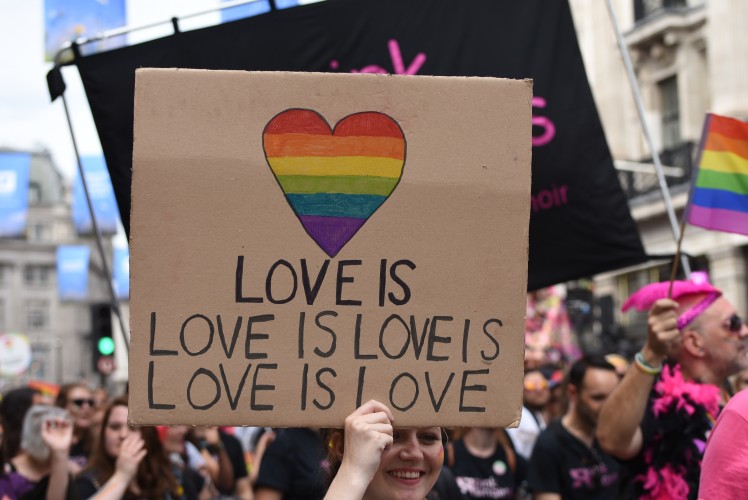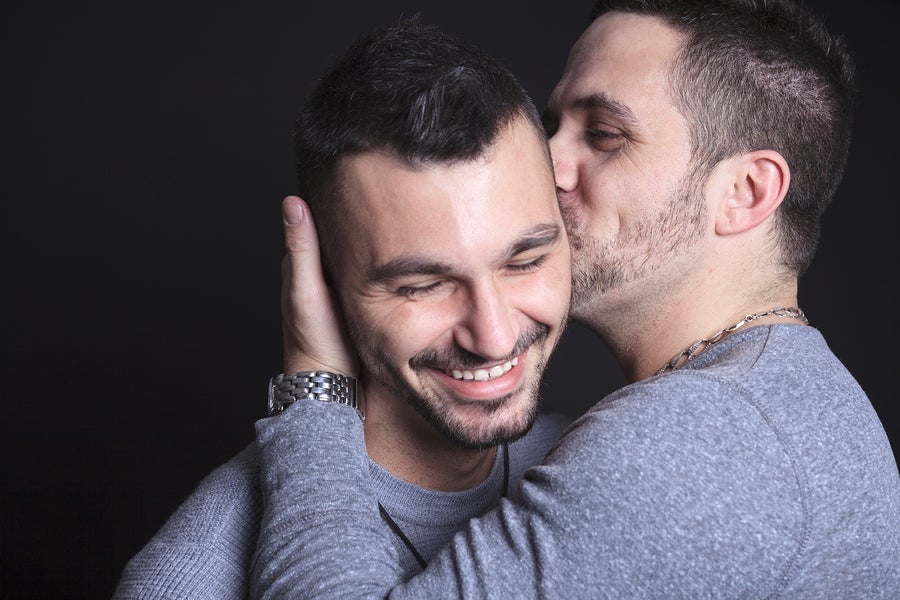How Should You Come Out of the Closet?

What Does Coming Out of the Closet Mean?
In modern culture, “coming out of the closet” typically means telling someone you’re gay, lesbian, bisexual or another kind of non-heterosexual sexual orientation. People may also choose to come out surrounding issues of gender identity. As we explain in our post about gender identity, sexual orientation and gender are two different things.
According to Stonewall, an LGBTQ+ research and support organization in the UK, there is no right or wrong way to come out. “The process of coming out can be very different for everyone and it can take some time to get to a point where you feel comfortable and confident enough to have those conversations with people.”
Just like everyone is different, the “right” way to come out is the way that makes you feel safe, supported and comfortable. Your experience should be uniquely tailored to you.
It’s also important to know that you don’t have to come out at all. As Dr. Jess, ASTROGLIDE’s resident sexologist, explains, no one should feel pressured to come out.
“I really want to emphasize that this is a matter of personal choice. You don’t have to come out. And you don’t have to conform to anyone else’s coming out standards. No one is an expert in your situation — except you. You are the expert. If you want to come out on social media, go ahead. If you prefer one-on-one conversations, that’s cool, too. And of course, you don’t have to explain your sexual orientation (or any other part of your identity) to anyone.”
Who’s Coming Out?
For people who identify as gay, lesbian, bisexual or some other non-heterosexual orientation, coming out of the closet can be a daunting prospect. They might worry about being rejected by parents or friends, or they might feel fearful for their personal safety.
Although attitudes toward LGBTQ+ individuals have improved in recent years, many people still report receiving a negative reaction upon coming out.
According to a Pew Research Center survey, about 39 percent of people who identify as LBGTQ+ say they’ve been rejected by a family member or friend after coming out about their sexual orientation. In the same survey, 30 percent of respondents said they’ve been physically attacked or threatened, and 58 percent said they’ve been the object of slurs or jokes about their sexual orientation.
It’s also interesting to note that people say they came out to their mothers more often than fathers. The survey results show that 56 percent of LGBTQ+ individuals told their mothers about their sexual orientation, compared to just 39 percent who told their fathers.
The good news is that the majority of LGBTQ+ people say their sexual orientation is a positive factor in their lives. Among all LGBTQ+ survey respondents, 34 percent said their sexual orientation is a positive thing, and 58 percent said it makes no difference in their everyday lives. In this group, just 7 percent said their sexual orientation is a negative thing.
Positive feelings were highest among gay men, with 46 percent saying their sexual orientation is a positive factor in their lives. Another 45 percent said it makes no difference, and 9 percent said their sexual orientation is a negative part of their lives.
According to Pew, part of this shift may be due to changing public perceptions about the LGBTQ+ community. In 1993, just 61 percent of Americans said they personally knew someone who identified as gay. In 2013, that number jumped up to 87 percent.
Shifting attitudes may also have something to do with more people identifying as LGBTQ+. According to a Gallup report, 4.5 percent of Americans are LGBTQ+. The number was higher among millennials, with 8.1 percent saying they’re gay, lesbian or bisexual.

Advice for Coming Out of the Closet
If you’re thinking about coming out to parents, friends or other loved ones, it’s a good idea to be prepared beforehand. This is a big decision, and it’s totally normal to feel nervous and maybe even a little scared. This is why making a plan ahead of time can help you manage your emotions.
Pick the Right Time
While you don’t have to plan a formal dinner when you’re coming out of the closet, it’s probably better to choose a time where you can talk to your loved one or friend without distractions.
Stonewall suggests setting aside time when you know you’ll have a chance to fully discuss the issue with the other person, especially if you suspect they might be blindsided by the news.
“It’s worth acknowledging that coming out could be a bit of a surprise to some people in your life. You’ve probably had a long time to get used to it, but the person or people you’re telling will be hearing it for the first time. Consider telling them at a time when you will be able to talk things through properly. For instance, coming out to a friend on your way into an exam probably isn’t the best time! Broaching the subject on the phone to a parent or guardian when you’ve only got two percent battery also isn’t ideal.”
Start by Telling One Person
You don’t have to come out in a Facebook blast to everyone you know — unless, of course, you want to. Coming out doesn’t have to be a one-shot type of thing, and you’re under no obligation to tell everyone you know at once.
In fact, Ditch the Label, an organization committed to ending bullying, recommends starting out by telling just one person. This can take the pressure off and help ease you into coming out. “Choose one person who you trust more than anyone else — a friend, sibling, parent/guardian or teacher. As soon as you’ve opened up to the first-person things will seem a thousand times easier and clearer for you.”
After you come out to that first person, they might even agree to be there when you tell others. Knowing someone has got your back can help you feel more relaxed about coming out to other people.
Read Coming Out Stories
For many people, coming out is a major transition in their life. They remember the first person they told, and how they went about sharing the news. Reading some coming out stories can help you know you’re not alone, and maybe give you some ideas for how you’d like your story to go.
As a bonus, many coming out stories are humorous and heartwarming. There’s nothing better than the awwww feeling you get while reading about how people’s families supported them after they came out.
You can read hundreds of coming stories at RUComingOut.com.

Be Prepared for Negative Reactions
Everyone deserves to feel supported and safe when they come out. Unfortunately, the reality is that some people will encounter a lack of support. While many people simply won’t know what to say, others will say the wrong thing — deliberately or simply because of ignorance.
Just because you get a negative reaction from someone now, however, doesn’t mean they won’t change their mind down the road. As Natasha Tracy at Healthy Place points out, sometimes people need time to process the shock they feel when they find out someone they care about is gay.
Additionally, parents of LGBTQ+ children sometimes experience feelings of disappointment or grief — not because they don’t love their kids, but because they mourn a certain lifestyle they expected their children to have. They might worry their LGBTQ+ child will encounter discrimination or difficulty meeting a long-term partner. In most cases, however, parents eventually understand that coming out allows their child to embrace who they really are.
While you might experience a negative reaction here or there, chances are you’ll also find some really supportive people. Dr. Jess stresses the importance of surrounding yourself with those who care about you, regardless of your sexual orientation. “I’m sorry you’re stuck dealing with this homophobia, sexism and/or transphobia. If someone is unsupportive, take care of yourself first. Don’t worry about them. Do whatever you need to feel okay in the moment. Leave if you want to. Give them a piece of your mind if you prefer. Seek the support of someone who cares about you. Ask for help if you need it. Reach out to a support line if you don’t have someone you can call. You deserve to be loved and supported.”
Dr. Jess also recommends checking out the LGBT National Help Center for resources and help or checking out our blog on how to respond to anti-gay arguments.
Practice Self Care
The Trevor Project stresses the importance of practicing self-care and making sure you know the signs of depression and suicide. Suicide is the second leading cause of death among all people between the ages of 18 and 24, and LGBTQ+ youth are three times more likely to commit suicide than their straight peers.
Coming out should be something you do because you want to — not because you feel pressured to do so. If you worry you’ll experience rejection that causes you psychological distress, it might be better to delay your decision or to seek resources that help you feel supported when you decide to tell family or friends about your sexual orientation. Here are our top self-care tips.

Tips for Supporting a Loved One Who’s Coming Out of the Closet
If someone comes out to you, do you know how to handle it? What should you say (or not say) to let them know you accept and support them? For many people, coming out is a huge step. Your support and empathy can mean the world to someone who’s worried about revealing their true self.
The LGBT Center at the University of North Carolina at Chapel Hill has great advice for supporting someone who’s coming out of the closet:
- Say Thanks – Let the person know you’re honored they trust you enough to come out to you. For many people, coming out is an emotional decision. If they come out to you, it’s because you’re important to them, and they feel safe sharing with you.
- Don’t Judge – Everyone has different beliefs and opinions. If you come from a religious or personal background that frowns on homosexuality, it’s best to keep it to yourself.
- Keep It Confidential – Coming out is an intensely personal decision, and your friend might not be ready for everyone to know. Make sure you maintain their privacy. Don’t tell others without their permission, and be careful about what you say on social media.
- Maintain Your Normal Relationship – Chances are, your friend or loved one has known they’re gay for some time. You might be finding out now, but this is normal for them. In other words, they haven’t really changed at all. You can still enjoy the same relationship. In fact, your friendship might even deepen and grow now that you know the person better.
- Don’t Be Too Serious – Humor can be a great tension reliever. Don’t be afraid to laugh with each other.
- Ask Questions – It’s normal to be curious about your friend or loved one’s sexual orientation, especially if you’re unfamiliar with it. Ask respectful questions, but remember that your friend isn’t necessarily an encyclopedia of LGBTQ+ knowledge.
- Include Their Significant Other – Once your loved one or friend comes out to you, they might feel empowered to be open about their significant other for the first time. You can help make the transition easier for them by including their partner on outings, dates, and get-togethers.
- Be There If/When Others Aren’t – If your friend or loved one experiences rejection, make an effort to be available when they need support.
- Help When They Come Out to Others – Offer to be present when your loved one or friend comes out to others.
- Keep in Touch – After someone comes out, they might worry that the people they tell secretly don’t support them. Reassure your friend or loved one by staying in touch as much as possible.
- Understand They Might Feel Frustrated – Coming out can make anyone feel a big range of emotions. Your friend or loved one might be moody or irritable as they go through the process of coming out. Let them know it’s okay and that you support them no matter what.
- Stick to Your Routine – When a person goes through significant changes, routine can be a familiar comfort. If you always work out together after classes, or you like to grab a cup of coffee together on the weekends, stick to your regular schedule.
- Let Them Know About Other LGBTQ+ Friends – Your friend or loved one might not realize that you already have LGBTQ+ friends or family members in your life. Sharing this part of yourself can help them open up more.
- Educate Yourself – If you’re unfamiliar with LGBTQ+ issues and challenges, take time to learn about the social, political and personal issues the community faces. This can help you support the LGBTQ+ individuals in your life. Start with this blog detailing the history of gay pride.
- Don’t Let Them Become Isolated – Many in the LGBTQ+ community report feeling lonely. These feelings of isolation can lead to depression. Make sure your friend knows you care and that you’re available to talk or spend time together.
What are some coming out stories you love? Let us know by tweeting us @ASTROGLIDE.
